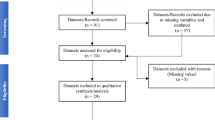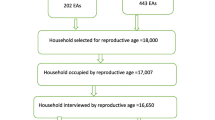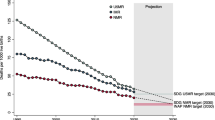Abstract
Objective
This study is designed to explore associated sociodemographic, birth-related and household characteristics with preterm birth (< 37 weeks) among Turkish and Syrian refugee women.
Methods
The data utilized in this study were obtained from the Turkey Demographic and Health Survey (TDHS) conducted in 2018. Various statistical analyses, including descriptive statistics, independent sample t-tests, and Chi-square tests, were employed to examine the differences in study variables between Turkish and Syrian refugee women. Furthermore, logistic regression analysis was conducted to identify the associated factors with preterm birth among Turkish and Syrian refugee women, allowing for comparative analysis.
Results
The key findings of this study revealed significant differences in sociodemographic (p < 0.05), birth-related (p < 0.05), and household characteristics (p < 0.05) that are associated with preterm birth among Turkish and Syrian refugee women. Also, nationality (OR: 3.427; 95% CI 2.770–4.241), delivery by c-section (OR: 1.630; 95% CI 1.370–1.939), educational status (OR: 0.674; 95% CI 0.547–0.832), place of delivery (OR: 0.806; 95% CI 0.666–0.975), and number of household members (OR: 1.206; 95% CI 1.013–1.437) were found to be important factors associated with preterm birth risk.
Conclusions
The key findings of this study contribute to the identification of women’s factors in preterm birth. By understanding the factors that contribute to preterm birth among both Syrian refugee and Turkish women, appropriate interventions can be developed to improve maternal and child health outcomes.
Significance
After the civil war that broke out in Syria, most of the Syrian people immigrated to many countries, especially Turkey. Changing living conditions and difficulties in accessing health services cause refugee pregnant women to face the risk of premature birth. This study contributes to the existing knowledge by emphasizing comparatively the sociodemographic, birth-related and household characteristics associated with preterm birth among the Syrian refugee and Turkish women population living in Turkey.
Similar content being viewed by others
References
Ajeet, S., Jaydeep, N., Nandkishore, K., & Nisha, R. (2011). Women’s knowledge, perceptions, and potential demand towards caesarean section. National Journal of Community Medicine, 2, 244–248.
Alnuaimi, K., Kassab, M., Ali, R., Mohammad, K., & Shattnawi, K. (2017). Pregnancy outcomes among Syrian refugee and Jordanian women: A comparative study. International Nursing Review, 64(4), 584–592.
Arpaci, H., Kurtoglu, E., & Temur, M. (2013). Family physicians’ views on caesarean delivery on maternal request. Journal of Clinical and Analytical Medicine, 4(1), 44–47.
Assi, R., Özger-İlhan, S., & İlhan, M. N. (2019). Health needs and access to health care: The case of Syrian refugees in Turkey. Public Health, 172, 146–152.
Büyüktiryaki, M., Canpolat, F. E., Dizdar, E. A., Okur, N., & Simsek, G. K. (2015). Neonatal outcomes of Syrian refugees delivered in a tertiary hospital in Ankara, Turkey. Conflict and Health, 9(1), 1–2.
Celik, İ. H., Arslan, Z., Işık, D. U., Tapisiz, Ö. L., Mollamahmutoğlu, L., Baş, A. Y., & Demirel, N. (2019). Neonatal outcomes in Syrian and other refugees treated in a tertiary hospital in Turkey. Turkish Journal of Medical Sciences, 49(3), 815–820.
Demirci, H., Yildirim Topak, N., Ocakoglu, G., Karakulak Gomleksiz, M., Ustunyurt, E., & Turker, U., A (2017). Birth characteristics of Syrian refugees and Turkish citizens in Turkey in 2015. International Journal of Gynecology & Obstetrics, 137(1), 63–66.
Directorate General of Migration Management. (DGMM) (2021). Temporary Protection. Available: https://en.goc.gov.tr/temporary-protection27. Accessed: December 22, 2021.
Ekmekci, P. E. (2017). Syrian refugees, health and migration legislation in Turkey. Journal of Immigrant and Minority Health, 19(6), 1434–1441.
Fleischman, A. R., Oinuma, M., & Clark, S. L. (2010). Rethinking the definition of term pregnancy. Obstetrics & Gynecology, 116, 136–139.
Hacettepe University Institute of Population Studies (2018a). 2018 Turkey Demographic and Health Survey. Available: http://fs.hacettepe.edu.tr/hips/dosyalar/Ara%C5%9Ft%C4%B1rmalar%20-%20raporlar/2018%20TNSA/TNSA_2018_ileri_analiz_raporu.pdf. Accessed: November 28, 2021.
Hacettepe University Institute of Population Studies (2018b). 2018 Turkey Demographic and Health Survey. Main Report. Available online at: https://fs.hacettepe.edu.tr/hips/dosyalar/Ara%C5%9Ft%C4%B1rmalar%20-%20raporlar/2018%20TNSA/TDHS2018_mainReport_compressed.pdf Accessed: November 28, 2021.
Hacettepe University Institute of Population Studies (2018c). 2018 Turkey Demographic and Health Survey Syrian Migrant Sample. Main Report. Available online at: https://fs.hacettepe.edu.tr/hips/dosyalar/Ara%C5%9Ft%C4%B1rmalar%20-%20raporlar/2018%20TNSA/2018_TDHS_SR.pdf Accessed: November 28, 2021.
Hidalgo-Lopezosa, P., Jiménez-Ruz, A., Carmona-Torres, J. M., Hidalgo-Maestre, M., Rodríguez-Borrego, M. A., & López-Soto, P. J. (2019). Sociodemographic factors associated with preterm birth and low birth weight: A cross-sectional study. Women and Birth, 32(6), e538–e543.
International Crisis Group. (2018). Turkey’s Syrian refugees: Defusing metropolitan tensions (p. 1-29). Europe& Central Asia Report.
Kanmaz, A. G., İnan, A. H., Beyan, E., Özgür, S., & Budak, A. (2019). Obstetric outcomes of Syrian refugees and Turkish citizens. Archives Iran Medicine, 22(9), 482–488.
Kiyak, H., Gezer, S., Ozdemir, C., Gunkaya, S., Karacan, T., & Gedikbasi, A. (2020). Comparison of delivery characteristics and early obstetric outcomes between Turkish women and Syrian refugee pregnancies. Nigerian Journal of Clinical Practice, 23(1), 12.
Li, X., Sundquist, J., & Sundquist, K. (2013). Immigrants and preterm births: A nationwide epidemiological study in Sweden. Maternal and Child Health Journal, 17(6), 1052–1058.
Ma, X., Fleischer, N. L., Liu, J., Hardin, J. W., Zhao, G., & Liese, A. D. (2015). Neighborhood deprivation and preterm birth: An application of propensity score matching. Annals of Epidemiology, 25(2), 120–125.
McAlister, B. S., Tietze, M., & Northam, S. (2013). Early term birth: The impact of practice patterns on rates and outcomes. Western Journal of Nursing Research, 35(8), 1026–1042.
Ozel, S., Yaman, S., Kansu-Celik, H., Hancerliogullari, N., Balci, N., & Engin-Ustun, Y. (2018). Obstetric outcomes among Syrian refugees: A comparative study at a tertiary care maternity hospital in Turkey. Revista Brasileira De Ginecologia E Obstetrícia, 40, 673–679.
Serin, A. N., Kayar, I., Birge, O., Çetin, F., & Seyhan, Y. (2019). Syrian refugees maternal health and perinatal outcome in Turkey: A retrospective population-based study. Journal of Gynecology and Women Healthcare, 2, 105.
Turkish Statistical Institute (Turkstat). Statistics on Child (2020). Available: https://data.tuik.gov.tr/Bulten/Index?p=Statistics-on-Child-2020-37228. Accessed: December 12, 2021.
Vural, T., Gölbaşı, C., Bayraktar, B., Gölbaşı, H., & Yıldırım, A. G. (2021). Are Syrian refugees at high risk for adverse pregnancy outcomes? A comparison study in a tertiary center in Turkey. Journal of Obstetrics and Gynaecology Research, 47(4), 1353–1361.
World Bank (2023). Fertility rate, total (births per woman) - Syrian Arab Republic. Available: https://data.worldbank.org/indicator/SP.DYN.TFRT.IN?locations=SY Accessed: July 12, 2023.
Yücesahin, M. M., & Sirkeci, I. (2017). Demographic gaps between Syrian and the European populations: What do they suggest. In D. E. Utku, K. O. Unutulmaz, & I. Sirkeci (Eds.), Turkey’s syrians: Today and tomorrow (pp. 187–211). Transnational Press London.
3RP Country Chap (2021–2022. Regional Refugee & Resilience Plan 2021). Available: https://www.unhcr.org/tr/wp-content/uploads/sites/14/2021/03/3RP-Turkey-Country-Chapter-2021-2022_EN-opt.pdf. Accessed: December 24, 2021.
Acknowledgements
The authors acknowledge Hacettepe University Institute of Population Studies for providing valuable guidance and support throughout the study. They are also grateful for the very kind support of all the Institute staff who shared their knowledge and experience.
Funding
We received no funding for this study.
Author information
Authors and Affiliations
Contributions
The first author (BS) conceived the idea for the study, conducted the study design and data analysis, and drafted the article. Other co-author (SC) contributed to the review of the data analysis, interpretation of the data, and review of the methodology. She also revised the article for important intellectual content. All authors approved the final version of the article and accepted responsibility for the article.
Corresponding author
Ethics declarations
Conflict of interest
None of the authors has any conflict of interest to disclose.
Ethical Approval
In the current study, which is based on secondary data analysis of deidentified data, the study was conducted by maintaining ethical standards with the permissions and survey data obtained from the Hacettepe University Population Studies Institute. Hacettepe University Ethics Committee had approved the TDHS (Turkey Demographic and Health Survey) study protocol.
Additional information
Publisher’s Note
Springer Nature remains neutral with regard to jurisdictional claims in published maps and institutional affiliations.
Rights and permissions
Springer Nature or its licensor (e.g. a society or other partner) holds exclusive rights to this article under a publishing agreement with the author(s) or other rightsholder(s); author self-archiving of the accepted manuscript version of this article is solely governed by the terms of such publishing agreement and applicable law.
About this article
Cite this article
Saylan, B., Cinaroglu, S. Exploring Predictors of Preterm Birth: A Comparative Study of Turkish and Syrian Refugee Women. Matern Child Health J 28, 506–512 (2024). https://doi.org/10.1007/s10995-023-03808-z
Accepted:
Published:
Issue Date:
DOI: https://doi.org/10.1007/s10995-023-03808-z




